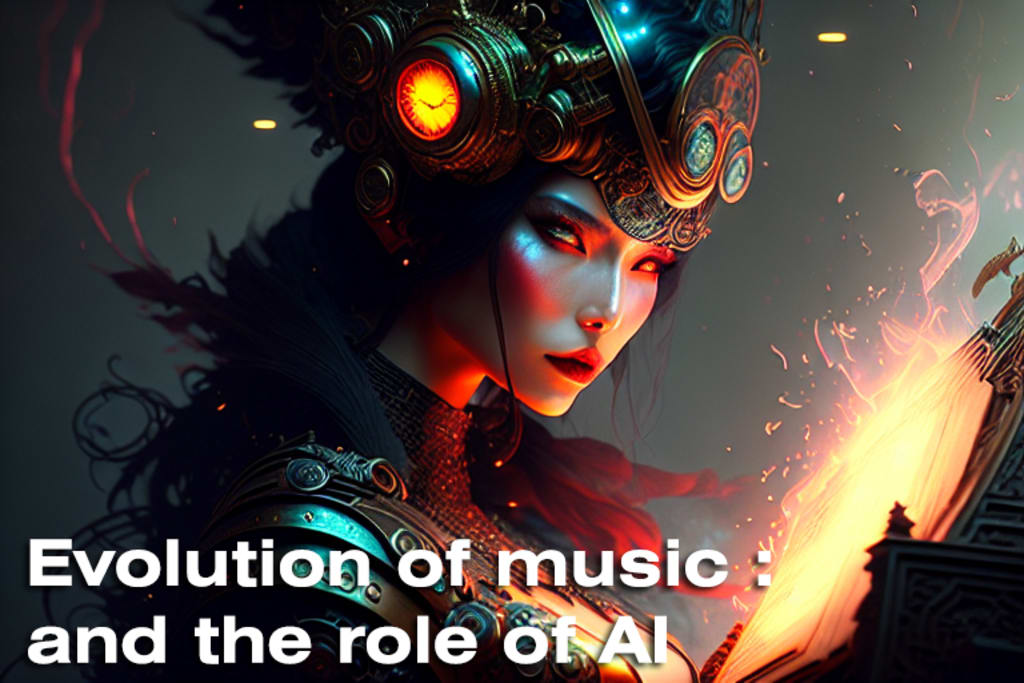Evolution of music and the role of AI
Man vs Machine: The Collaborative Future of Music Creation

Music has been a part of human culture for thousands of years and has undergone various transformations over time. With the advent of technology and the integration of AI, the music industry is undergoing yet another significant shift. This article explores the evolution of music, from pre-electronic music to the current era of AI-generated music, and the impact of AI on the music industry.
Pre-Electronic Music: The Era of Traditional Music Making
Music has been a part of human culture for thousands of years and has undergone various transformations over time. In the pre-electronic era, music was made using traditional instruments and was reliant on human talent and creativity. The sounds that could be produced were limited to the instruments available and the skills of the musicians. The music produced during this time was characterized by simple melodies and rhythms, often accompanied by singing and lyrics.
Introduction of Electronic Music: The Emergence of Synthesizers and Other Technology
With the advent of electronic instruments, synthesizers, and other technology, the soundscape of music changed dramatically. Electronic instruments allowed for the creation of new sounds, leading to the emergence of new music genres such as electronic dance music (EDM) and techno. Synthesizers, in particular, enabled musicians to create rich and complex soundscapes, leading to a new era of music creation and production.
AI in Music Creation: From Analysis to Generation
With the advancement of AI technology, music creation has taken another step forward. AI algorithms and systems are now capable of creating music by analyzing existing songs and generating new melodies, beats, and lyrics. For example, AI algorithms can analyze the chord progression, melody, and rhythm of a song and use that information to generate new music that is similar in style. AI-generated music is becoming increasingly prevalent, especially in the context of video games, movies, and commercials, where AI is composing entire soundtracks.
AI-Assisted Music Production: Enhancing the Creative Process
In addition to generating music, AI is also being used to assist musicians in the creative process. AI tools and plugins can provide suggestions for chords, melodies, and rhythms, making it easier for musicians to come up with new ideas. AI can also help with the arrangement and mixing of music, taking the burden off of musicians and allowing them to focus on the creative aspects of music production. By providing musicians with new tools and techniques, AI is helping to enhance the creative process and open up new avenues for music creation.
AI Music Performance: Collaboration Between Man and Machine
AI is also being used to power music performance, enabling AI systems to play musical instruments in real-time, in collaboration with human musicians. With the help of AI, musicians can now create new sounds and perform music in ways that were previously impossible. AI-powered music performances are becoming more common, as musicians look for new ways to incorporate technology into their performances.
AI-Generated Music: The Future of Music Creation?
AI-generated music is becoming more prevalent and is set to play an increasingly important role in the music industry. With the help of AI, music creation is becoming more accessible and efficient, allowing for the creation of new sounds and styles that were previously impossible. AI-generated music is also opening up new revenue streams for the music industry, as AI-generated soundtracks and music are used in a growing number of applications.
The Impact of AI on the Music Industry: New Business Models and Revenue Streams
The integration of AI into the music industry is having a significant impact, leading to new forms of music creation, performance, and distribution. AI technologies are enabling new business models and revenue streams, as musicians and music companies
In conclusion, the evolution of music from pre-electronic to the current era of AI-generated music is an ongoing process that is being driven by advancements in technology and AI. AI is helping to enhance the creative process, enabling musicians to come up with new ideas, and opening up new avenues for music creation. At the same time, AI is also being used to power music performance, enabling musicians to create new sounds and perform music in new ways. The impact of AI on the music industry is significant, as it is leading to new business models, revenue streams, and distribution channels.
Despite the many benefits of AI in music, there are also ethical considerations to take into account. The role of AI in music, especially in the context of AI-generated music, raises questions about the authenticity and artistic value of music created by machines. However, as AI continues to evolve, it is clear that it will play an increasingly important role in the future of music, shaping the way we create, produce, and experience music.
Overall, the integration of AI into the music industry is a rapidly developing area that is transforming the way we think about music and its creation. Whether AI will completely replace human musicians remains to be seen, but it is clear that AI will play an important role in the future of music and that the collaboration between man and machine will become increasingly important.





Comments
There are no comments for this story
Be the first to respond and start the conversation.